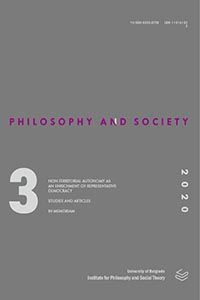The possibilities and limits of non-territorial autonomy in securing indigenous self-determination
The possibilities and limits of non-territorial autonomy in securing indigenous self-determination
Author(s): Natalija ShikovaSubject(s): Politics / Political Sciences, Anthropology, Social Sciences, Political Sciences, Civil Society, Governance, Sociology
Published by: Institut za filozofiju i društvenu teoriju
Keywords: non-territorial autonomy; indigenous people; self-determination; self-governance; decision making; Sámi people;
Summary/Abstract: Non-territorial autonomy (NTA) incorporates a mixture of different arrangements such as consociationalism and national-cultural autonomy (NCA), and forms of representation that de-territorialize self-determination. The paper analyses NTA possibilities in reaching indigenous self-governance and reveals the dilemmas in the applicability of NTA for securing the right to self-determination of indigenous peoples. Although the practice points towards some positive examples and successes of NTA institutions related to ingenious peoples (e.g. Sámi Parliaments), the question remains whether NTA holds sufficient potential for addressing indigenous needs upheld by the international principle “right to land, territories and traditionally owned resources.”
Journal: Filozofija i društvo
- Issue Year: 31/2020
- Issue No: 3
- Page Range: 363-381
- Page Count: 20
- Language: English

